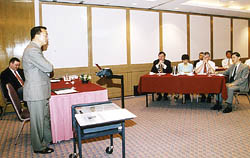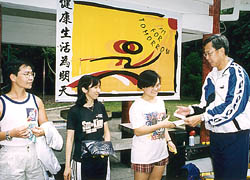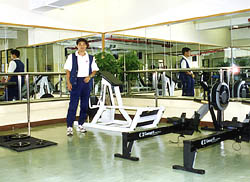



















 A shift from concerned contentment to renewal. DCP MAN addressing the ACPs: "It doesn't mean we will achieve utopia, but we are committed to continually improving" | "You have a large Force with entrenched opinions that it is already the best in the world. But you have to improve and move forward otherwise you stagnate. Hong Kong is moving forward. Its police must, too. The Force's senior management understand that" IN order to introduce and explore the values set out in the Hong Kong Police Force's "Vision and Statement of Common Purpose and Values" launched in December 1996, workshops were held throughout 1997 which involved all police in an attempt to identify the weaknesses and the inadequacies of the Force in pursuing certain values. |
|
Throughout 1998, in the next wave of this ongoing, evolutionary process, commitment to these values was pursued and reinforced in a more generalised way with feedback from the "Living-the-Values" workshops collated and assessed for action. The Commissioner of Police and the Senior Directorate had an Away Day last July where it was realised that the time had come in the progression of the living-the-values vision to take a more focused approach. They identified three core issues for the next wave of workshops: honesty, trust (support and encouragement), and internal communication. "We're already identified the problems and issues, now let's get on with actually improving things in the most constructive way possible,"Ó says Deputy Commissioner of Police, Management, Tsang Yam-pui. "In the next stage we need action plans to address the issues identified in the Vision and Statement of Common Purpose and Values and from the workshop feedback." A lot has been done already. As Chairman of the Steering Committee on Police Internal Communications Mr Tsang has overseen vast improvements to the flow of information through better use of notice boards, news flashes, training days, TSROs, the staff suggestion scheme, staff opinion survey, proposed formation bulletins, Senior Directorate visits, upgrading of the PEN system, restructuring and improvements to internal communication ¡Ð the list goes on. "But changing individuals and their culture is far more difficult to achieve than building a structure to improve internal communication," says Mr Tsang. "This next stage of the workshops will allow officers to make better known their concerns about internal communication. It is also hoped that the sessions will make it clearer to senior officers of the necessity to pass on information of staff interest at the earliest opportunity and to develop the necessary skills in communicating with their staff. The Force Anti-Corruption Strategy, Anti-Gambling and the Healthy Lifestyles Campaigns also continue to create a positive cultural change within the Force. "In the beginning some officers may have regarded these campaigns as just gimmicks full of slogans," says Mr Tsang. "But gradually the message is setting in and I think they're working. The same goes for the living-the-values workshops. They are part of an instrument to effect a change of culture in the Force. Honesty, trust and internal communication are three simple subjects. But they are so important that if we can get them right, the Hong Kong Police can be so much better. "If everyone in the Force is honest and has full integrity, then we will need less supervision, there will be little or no corruption and few complaints against the police. Most important of all is that we will have complete trust from the community and enjoy an even better public image. "We are one of the cleanest forces in the world, but as DCP MAN, I still come across disciplinary cases related to dishonesty. Although these are isolated cases, I think we can do better to prevent their occurrence. This is our aim. It doesn't mean we will achieve utopia, but we are committed to continually improving. So this next phase is a natural progression and not a matter of being subjected to' another round of living-the-values workshops." Reflecting this natural progression, unlike the previous two waves of workshops which were conducted by outside consultants, this time Hong Kong Police officers will be running the workshops themselves. A consultant was contracted only to design the workshop package and prepare facilitating officers to run the workshops. He met with DCP MAN and all Assistant Commissioners of Police in two preparatory sessions earlier this month when issues around the three identified themes were discussed and agreement on the overall approach and delivery of the workshops at different levels was reached. ACPs will now run workshops to facilitate formation commanders (CSPs, SSPs and civilian equivalents) in December and January 1999, who then oversee workshops to facilitate inspectorate level officers and civilian equivalents from February to April, followed by Unit Commanders (SPs) facilitating workshops for JPOs and civilian equivalents from May to August. "In other words," says DCP MAN Tsang, "our own officers are going to be running the workshops. The importance of this kind of approach is that junior officers will talk with senior officers in face-to-face discussions about day-to-day issues without going through an intermediary. "Encouraging greater openness between both parties, our own officers will be addressing the targeted issues of honesty, trust and internal communication and in the process of doing so raise more realistic examples pertinent to police officers - issues of which professional consultants have little first-hand knowledge. Using very simple methods will make improvements in the Force." The objectives of this next wave of workshops are also to inform Force members about top management responses to first wave feedback; to encourage individual responsibility and contribution for improvement; to obtain further feedback; and to make concerns of the current themes better known to officers of all ranks. "These days we are talking about empowerment and giving greater trust to our junior officers," says Mr Tsang. "By giving our officers full trust, we can save time, money and staff. We can even increase productivity if the staff enjoy full trust and thus become more motivated. Some say that our long rank structure, our hierarchical system and the many layers of laid down supervisory procedures are built on the premise of mistrust. This is true to a certain extent. However, we need a system of checks and counters to strike a balance. He continues: "This next wave of workshops should help clear the air on matters of trust for both senior and junior officers by creating an atmosphere that encourages people to raise examples within their area of work to demonstrate where more trust can be given, or, for a senior officer to explain why greater trust is withheld ¡Ð which in many cases is due to the inexperience of a junior officer and not because he or she is not trusted. These workshops are where discussion can focus on how greater trust can be given in certain areas so that there will be no misunderstandings." Says Professor Paul Kirkbride, whose consultancy firm was involved in the first stages of the living-the-values workshops and who has designed the latest workshop package in preparation for police officers to run their own workshops: "As an outsider, I'm very impressed by the Hong Kong Police Force's commitment. I've seen this whole Vision and Culture Change thing done badly by other major organisations where the initial enthusiasm fizzles out after a couple of workshops. "This is the 'next' wave - indicating that the Vision has become a living thing. It's the evolution of a basic cultural change within the Force ¡Ð a moving away from an autocratic command and control style to a more modern managerial leadership which more complex organisations require. The old style is not relevant as the organisation ¡Ð and society ¡Ð moves forward. "But it's still a disciplined service. So the idea is not to ape the private sector, but rather to adopt that right kind of managerial and leadership behaviour for the modern era. It's a matter of how you then change that. It's very difficult. You have a large Force, you have entrenched opinions, you're got the feeling that the Force is already the best in the world. But you have to improve and move continually forward otherwise you stagnate. Hong Kong is moving forward. Its police force must, too. The Force's senior management understand that." | |
|
Healthy Lifestyles
| |
|
THE Police Headquarters Sports and
Recreation Team organised a Fun Run on 2 December with its 80 participants finishing
the 3.5 kilometre route along Bowen Road ¡Ð all part of the 30-Minute Exercise Promotion
Scheme which aims to encourage Force members to participate in sports during their spare
time. Guest of honour, Director of Management and Services Dick Lee Ming-kwai, donated
and presented prizes to the winners of the race's climactic lucky draw.
Since the introduction of the 30-Minute Exercise Scheme by the Sports and Recreation Division of Personnel Services Branch, users of Arsenal House fitness centre have increased by 30 ¡Ð about 3,000 per month. |
 |
|
To further encourage Force members to utilise the fitness facilities at Police Headquarters, lucky draws will be held every week starting 2 January for three months. Force members can enter each time they use the fitness centre ¡Ð where complete details of the draw are posted. | |
 |
RENOVATIONS have been completed to
double the size of the third floor fitness room of TST Police Station ¡Ð which was re-opened
by C D Prowse, DC YT, on 1 December.
Accessible from 7am to 10pm, the centre boasts the latest equipment, a sound system to enjoy music while working out ¡Ð and potted plants supplying much needed oxygen and a sense of serenity after a hard day's work. |

